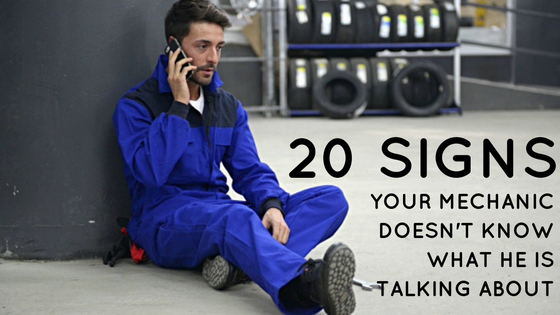20 signs your mechanic doesn’t know what he is talking about
We’ve all been in this situation before… your car begins smoking or making noises you only thought were possible when small animals die, and now you’re stuck trying to find a decent shop. You’ve heard all the horror stories, you’ve seen the outrageous amounts dealerships charge, so you’re looking for a nice local shop where you won’t get taken for a ride. One problem…most of the local shops are run by gang members or men so old you’re pretty sure they have no idea how to operate Microsoft Paint, let alone try to delve into the computer issues on today’s vehicles. Here we have assembled a list of 20 easy-to-spot signs that you may be better off having your 3 year-old attempt a fix than have work done at such a shop.
1. Your friends have had bad experiences at the shop. Okay so this may seem like a no-brainer, but in all seriousness when you need to choose a shop for work on your car, ask your friends. Let their experiences help you in finding a good quality place and a good price.
2. The shop requires you to pay before the work is done. Most reputable shops will give you an estimate, perform the work, and then charge you after you’re sure the problem is fixed. This is the only reasonable business practice that makes sense, because having you pay before you can be sure the problem will actually be fixed just screams shadiness.
3. The mechanic is not certified by any national association. While certification certainly does not ensure good work and there are good mechanics who don’t bother with these things, as a general rule of thumb, shops which have mechanics certified by national organisations such as the MTAA (Motor Trade Association of Australia) generally provide a better level of service.
4. The parking lot is full of cars that don’t appear capable of movement. This may also seem like a dead giveaway, but many people in the search to save money will end up at a place like this. The general appearance of the shop, including the cars outside, can give you good insight into the quality of the service performed. Do you want your vehicle lined up among the sea of dead vehicles? I think not.
5. The mechanic attempts diagnosis based upon your broad description. Most of the time one symptom can have a wide variety of underlying causes. While listing a variety of possibilities is not a bad thing, a mechanic who seems to know exactly what is wrong based upon your simple description probably has no idea what is going on and is just guessing at this point. Without a thorough diagnosis, it can be very difficult to pinpoint exactly what is wrong.
6. The shop has lots of bad reviews online. In today’s internet age, it is very easy to research a place of business and find reviews by other customers. A few minutes spent online at a search engine could save you time, money, and hassle later on.
7. The mechanic does not appear to have specific knowledge of your make and model. Some repair shops specialize in certain brands, while others attempt to do everything. Either way, they hopefully see a large volume of customers, and because of this should have some knowledge of your car’s specifics without needing a manual or computer first. Simple things like a knowledge of engine size, which wheels drive the car, and approximate model year, among many others, can let you know that this mechanic has worked on cars like yours before and will most likely do a better job.
8. No estimate of time for repair. Shops which cannot provide an estimate of the time it will take to fix your car most likely have not worked on a car like yours before or simply are backed up and should be avoided.
9. Time for repair seems unnecessarily long. If the shop has quoted you a time for your repair which seems incredibly long, call around to other shops first and ask how long it would take them. If the repair estimate is unreasonable, finding another shop is a great idea, as the one you are at most likely has no clue what they are doing.
10. The shop is very new or has very little history in the area. While every shop needs customers to build up a history, newly opened shops may not be the best place to find good quality or the best deal. Shops that have been in the community a long time have to be doing a good job, otherwise they would have gone out of business a long time ago.
11. The mechanic tries to suggest a myriad of other services for you at the time of your repair. Preventative maintenance may be the best way to avoid long-term hassle, but many times these offers of additional service (for a fee) are unwarranted and just attempts to get more of your money. Read your owner’s manual and know the timetable for services so that you can avoid being suckered in by a shop that is only out for your pocketbook. Shops that try to get you to purchase all sorts of extra services are not looking out for your best interests, and this applies to the quality of their repairs as well.
12. The mechanic suggests fixes which don’t add up. Even though the average consumer does not have an extensive working knowledge of an entire automobile, some fixes just don’t make sense. Use your judgment and common sense to question the mechanic if something seems out of place. For example, if you were having air conditioning issues and the mechanic suggests an exhaust problem, you may want to pack up and leave. Once again, use the internet as a resource to research possible problems before going to the mechanic so that you can be at least educated enough to spot someone trying to pull one over on you.
13. The shop tells you you need to fix more things than you came in for, without a thorough explanation. While diagnosing one problem it is not uncommon to come across one or more secondary problems. For example, you need your brakes fixed but they suggest new tires, suspension fixes, or steering box problems. While it is very possible that while doing one job the shop may come across other things that need work, they should be able to explain this all to you in a manner you understand.
14. Lack of sufficient explanations. Following from #13, ANY instance at a shop where they suggest a repair but cannot thoroughly explain not only the reasoning but the procedure behind it should be a red flag. If a list of problems suddenly jumps up from their “master technician”, ask them which ones are the most important and which could hold off. In most instances, if your car has been running fine for quite a while, it is unlikely that there are multiple serious failures lurking underneath, and the shop should be able to explain if that is the case.
15. The mechanic gives you a line like “good thing you brought this in, the car probably would not have lasted another 50 miles.” Man, what are the chances that you happened to bring your car in at just the right time, to just the right shop! Lucky you! WRONG. Chances are, if you have been driving your car around for a little while with a warning light on or a noise, it was not very close to total failure. Shops which say things like this are just trying to make you feel lucky for their services and will undoubtedly overcharge you for their services.
16. The mechanic suggests one fix first, then when that doesn’t work, claims they “know” what has to be wrong this time. Sometimes shops have a few go-to fixes for things (alternator + battery for electrical problems, for example) and will jump to these first, then look for other problems later. If a shop charges you for a fix but it doesn’t actually fix the problem, they should be willing to refund at least some of your money, if not all, because after all, you have trusted them with fixing the problem, not playing trial-and error games with your money.
17. Insisting they are the best in town without awards or recognition from the community to back it up. Most any business will try to tell you that they are the best for the job, but look for proof. If a shop has been in the area for a while, look for local recognition (newspapers, chamber of commerce, etc.) to back it up. Without proof these claims might as well be thrown out as garbage.
18. The shop installs a new part, it fixes the problem but then fails soon after. There are cases of new pieces being defective from the factory, but it is also possible that the shop installed the part wrong and this caused it to fail. In general, if the shop is not willing to replace the part free of charge, they should be avoided in the future.
19. The mechanic won’t wait on you to call around to other shops or take the car other places to get estimates. Often times, if the repair is a major one you might want to call several places and get estimates to make sure you are getting a good deal. If the shop you are at tells you you can’t leave your car there for a few hours while you call around, they’re not worth your business.
20. The mechanic cannot understand your explanation of the problem and asks you multiple times to repeat or rephrase. Shops which have knowledgeable staff and provide good service should be able to understand the problem as told by a common person. You might not use the same technical terms, but if they cannot understand your explanation, there’s a good chance they won’t find the right problem. If you can’t explain it in words, ask them to come look at the car or take a short ride with you, if they want your business and are really interested in providing you with the best service, they will agree.


Leave a Reply
Want to join the discussion?Feel free to contribute!